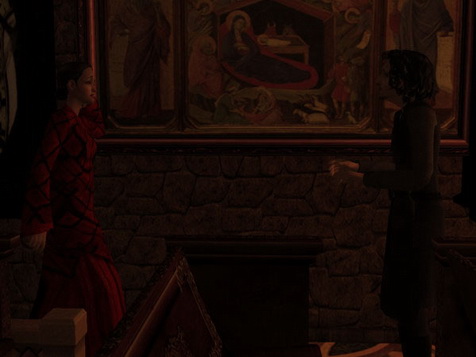
“You came…”
After her first hesitation, Flann strode towards him with such self-assurance that he was convinced that she meant to walk directly into his arms.
In spite of all her doubt and defiance, when he had needed her, she had known it, and she had come.
“Flann…”
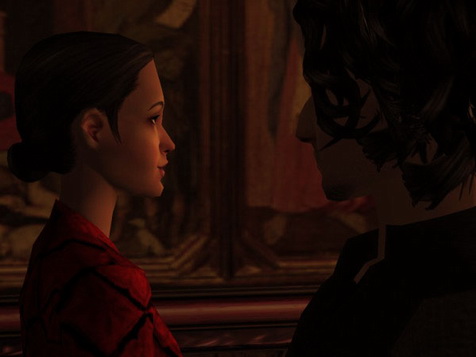
But she kept coming.
She walked past him without a glance, as if he were not there, but carefully avoiding him to prove he was.
She walked to the candles and stood a shadow before them, rimmed by a halo that was not hers. She gouged her thumbnail into the soft wax that pooled at the bases of the shortest tapers.
Then she walked a few steps farther and stopped at the corner of the altar.
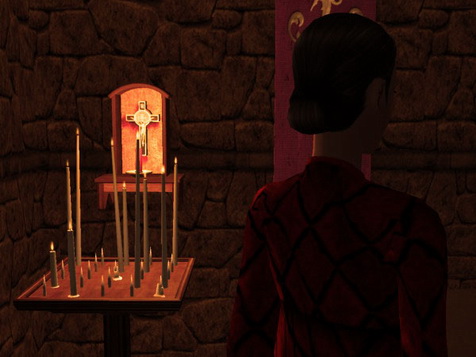
“How long have you been here?” Beyond the chill of her tone, her voice was hoarse and her consonants muffled, as if she had a cold – or as if she had been crying.
Had she felt what he had? He did not want her to suffer so ever again, but it thrilled him all the same. It was a beautiful, almost miraculous proof of their bond.
“An hour or two…” he ventured. “Since the brothers went out after Matins.”
“I thought you might have seen me coming and run here to surprise me.”
“I knew nothing of it,” he murmured soothingly, as men spoke to skittish foals: if he said the wrong thing he knew she would bolt. “I could not sleep…”

She snorted. “And when you cannot sleep, you come to pray for ‘an hour or two’?”
He thought his presence and the pools of wax sufficed as answers.
She tried to glance at him over her shoulder, but he was silent and still. He knew her well enough for that. Finally she turned around.
Only then did he speak. “Tonight I do, and my prayers are answered.”
Her lip began to curl into a sneer.
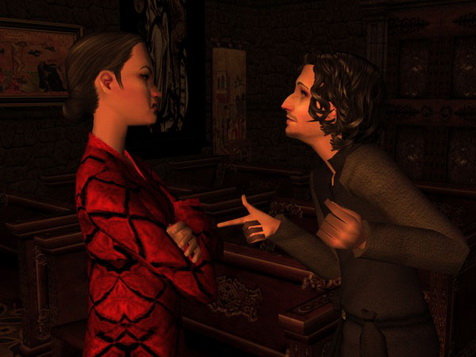
“And you, Flann?” He paused to savor her name as it dissolved on his tongue. He was speaking to her, and for once she was hearing. She had come. “Could you not sleep?”
She reared back her head and turned her face aside, but not quickly enough to prevent him from seeing the grimace of pain’s echo on it.
At that instant a galloping fear overtook his joy. At last he understood that she might not have come on account of his own anguish but for some dreadful reason of her own. She could not have known he was hurting. She would not have come if she had.
“Flann! What has happened?” he begged. “Liadan!”
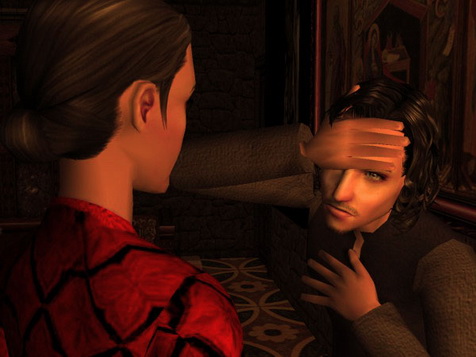
He had said her name as often as her mother’s, despite having seen her only a few times in her life. He had lipped it, whispered it, purred it, cooed it, laughed it; he had practiced it in every tone except one of terror. If she was ill – if she was in danger–
“My daughter is with the Abbot,” Flann snarled. “Nothing has happened. What is she to you?”
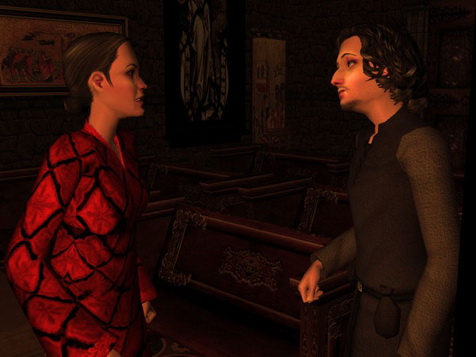
It was not merely a rebuke meant to put him in his place. She balled up her fists, clenched her teeth, and stared at him with such defiance that her rigid body shook with the strain of keeping itself still.
Araphel knew her so tragically well. He knew this was Frightened Flann defending herself with fury. This was how she had faced everyone – even him – after her pregnancy had become known.
He ought to have defended her then, and then she would have had peace. If only she would give him a chance, he would defend her now forever, in spite of everything. He had too much to lose, and too little assurance that he would ever gain anything more.
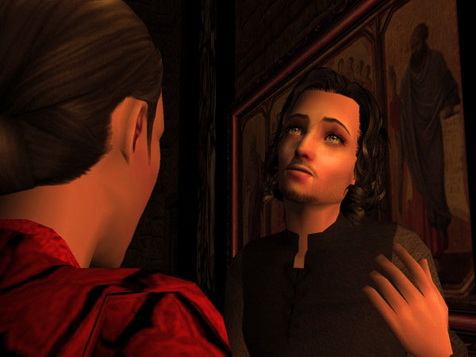
“Are you wanting me to say it?” he asked softly.
“Aye. Aye, I’m wanting to see whether you’ll dare.”
“She’s the wee daughter of me.”
Flann clamped her teeth together and screeched. If she had said a word, it had been torn too ragged to be recognizable by the time it left her mouth.
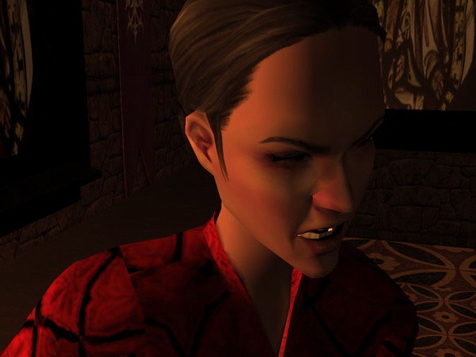
He dropped his French accent, in spite of anyone who might have heard. He wanted to speak to her as he had spoken to her before, in a language that was pure. “My treasure…”
“You never touched me, sir!”
“Not with these hands…” He distracted her by waving his hands vaguely while his feet advanced a step.

“How? How? How?” she panted. “How are you wanting me to believe that?”
“It’s by my eyes you would be knowing me…” He distracted her with his eyes and stepped closer.
“How? Tell me how! What foul magic is this? Are you a demon?”
So reminded, he stopped in his advance. “Didn’t the sister of you tell you anything about her husband?” he sighed.
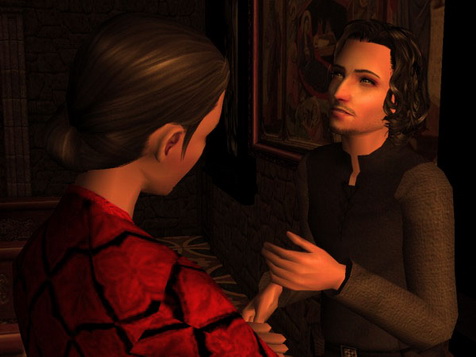
For weeks he had been dreading the merest wink or whisper from the part of Eithne, but suddenly he wished she had told Flann what Dantalion had told her. Flann might more readily have believed him if she had heard the same story from other lips.
“Only the name of him! And not even his clan! Not a word will she say, and I think she’s fearing him like the death! Who is he, then? What is he? The brother of you?”
“No! He’s… a cousin…”
“A demon like you?”

“No, Flann, no!” He sighed in Sebastien’s ill-concealed exasperation. “He’s not a–we’re not – ”
Araphel did not know what Dantalion had told Eithne beyond what he had revealed on the night of their marriage, but he would have to be true to at least that much.
More importantly, he did not want to say anything that would shake Flann’s beautiful faith in her religion. He who had been her confessor knew how very dear it was to her in spite of her brazen front. She went to God as shyly and as sweetly as she had used to go to him, and he knew it was the true Flann. It was the Flann she would be again when he stood between her and the world and she had nothing left to defy.
“We aren’t demons, my treasure,” he said gently in Brude’s rippling Irish Gaelic. “We are angels.”
“Ha! ha!” She stomped past him and flung up an arm to point at the gilded heads of the angels painted on the wall. “Where’s your halo, sir?” she sneered.

“We don’t wear halos,” he sighed. He heard traces of Sebastien’s inborn peevishness on his voice and took a deep breath to calm himself. “Those are paintings,” he murmured, putting on the gentle patience Brude had so easily worn. “Those are copies of copies of copies of pictures of what the first painter tried to paint: simply light.”
“I’m not seeing you glowing, either.”

“Not in this body.”
“In this body!” she snapped. “Do you take yourself for the Lord? Become flesh, are you? We shall ask the Abbot what he thinks about that!”
He yelped, “No!” and she turned on him with a savage grin.
“Ach! You’re not liking that idea, are you?”

“Not him!” he pleaded. “Him last of all! Flann, that’s why I am here! For him!”
“What about him?”
“I’m here to help him and guide him, but he mustn’t know it! Flann, please! He mustn’t know!”
“Why?” she frowned. “What is he to you? Does every priest get a private angel?” She lifted her nose and laughed in scorn.
“No. Aelfden is a saint.”
Her laughter softened slightly, though she turned it away from him. “At last you’re telling me something I can believe!”
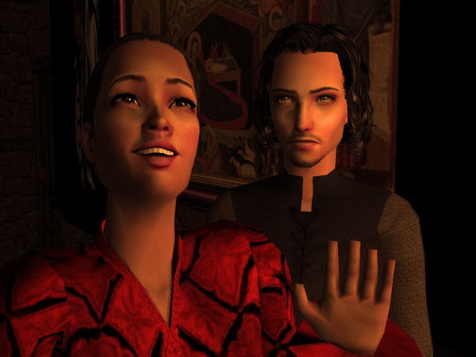
He took advantage of her hint of indulgence to launch into the explanation he had imagined perhaps a hundred times, though it spewed out at Sebastien’s frenetic pace.
“It’s a saint he is, and I to guide him, first as Brude – but he grew to be too dependent on Brude – and now as Sebastien – and that is why I’m so dreadful to him – to make him strong. Are you seeing? But I could have come back as a priest, but I didn’t – I came back as this scholar so I could be with you and Liadan. Are you seeing?”
She glared at him through such narrowly slitted eyes that she could scarcely have seen anything.
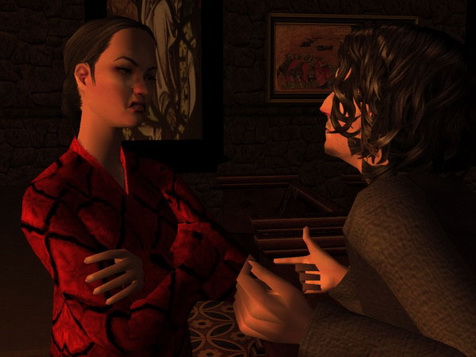
“Didn’t I tell you to know me by my eyes, treasure?” he begged. “I meant to try to come back to you as Brude, but I knew I might not. And I wanted you to know me when I came. And I gave you the hair of my head, too, for I knew it would be changing if Brude ever died.”
At last she reacted, but it was only to shudder. He had always known it would be cruel, from the moment she saw it change until the moment she learned why, but such had been his longing for proof. Nevertheless she did not believe.
“Ask me anything, treasure,” he pleaded. “Anything only Brude would know.”
She turned disdainfully away from him, but she did not step away when he leaned closer.
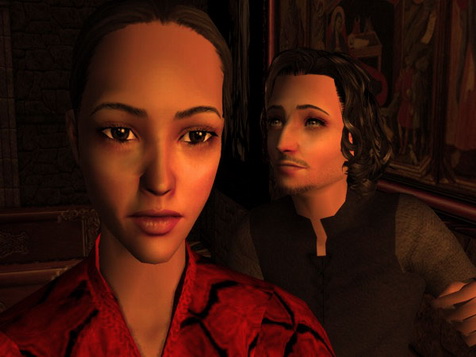
He saw his chance: if she was not looking at him, and if only he could soften Sebastien’s voice to a semblance of Brude’s, it would be so easy for her to imagine, and thence to believe.
“Anything you might have confessed…” he murmured. “Or anything we might have done or said alone. Are you remembering, love?”
She was so silent, so still, and so near that his hand came up almost of its own to touch her. So Brude had often touched her, caressing her with the backs of his fingers in some shadow of her body.
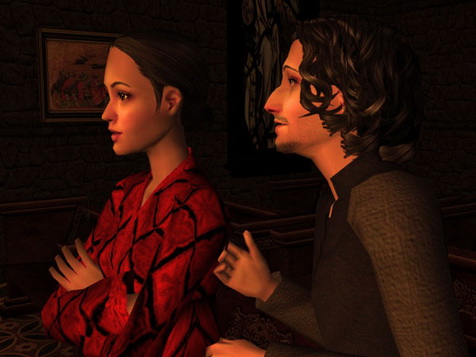
Even when they were not alone he could not stand to be near her without touching her. Whenever he did, he was grateful that the Creator had ever made such bothersome things as bodies.
She neither turned to him nor stepped away. She only stood with her face slanting slightly towards his, wearing the sour, skeptical expression of a housewife tasting a burned porridge to decide whether it was worth keeping.

“Only ask the sister of you,” he suggested, using the excuse of a whisper to lower his head nearer her ear. “Ask her whether her husband is an angel. If she has not spoken about it, I think she will be relieved to have it said. If – only you will keep it a secret between you…” he winced.
“Is he dead too?” she asked slowly. “Will he be returning another man?”
“It’s little I know about the ways he’s taking, and where and why. He’s only the cousin of me.”
“Poor wee girl bride,” she whispered. She stepped away from him, dragging her feet as if they were stony weights holding her down. “And it’s ‘angels’ you’re calling yourselves?” She shook her head in disgust. “She’s going mad with the grieving for her man. Perhaps so am I…”
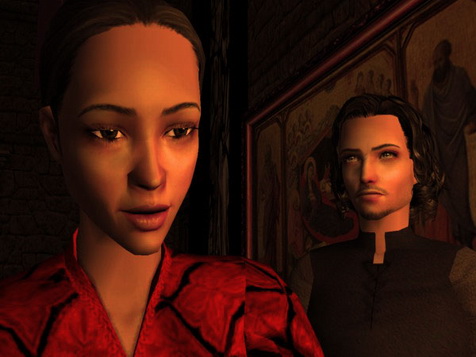






Looking at the banner, Liadan will finally smile to her mother.
Come on Flann, sweet Flann... If she only understood, perhaps she could then decide between him and Osh on a fair level, it's never easy competing with a dead man...